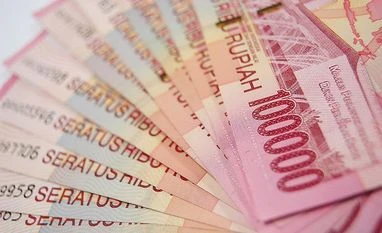The Indonesian rupiah hit a fresh four-year low on Friday, set to see its worst week in more than five years as most emerging Asian currencies stayed on course to post weekly losses.
Most currencies, however, rebounded on the day due to shortcovering ahead of the weekend.
The rupiah fell 0.3% to 10,830 per dollar, its weakest since April 2009, as investors awaited a government announcement on a policy package to curb inflation and boost jobs in the early afternoon.
Before the announcement, Jakarta shares <.JKSE> rose 1.4%, while forwards markets pointed to a slight rebound in the currency.
But spot rupiah stayed under pressure from dollar demand from importers for month-end payments, traders said. Some traders placed bids higher than the interbank market level and some were already traded above 11,000, they added.
The Indonesian currency, along with the Indian rupee, are seen as the most vulnerable to the Federal Reserve's withdrawal of monetary stimulus due to widening current account deficits, slowing economic growth and strong resistance to enacting much-needed reforms.
On Thursday, Fitch Ratings said those two countries are not at immediate risk of a credit rating downgrade but it could act if their governments failed to calm financial market tensions.
"I am worried about the possibility of a downgrade by Fitch for Indonesia," said a Jakarta-based trader, adding that a potential ratings cut will accelerate capital outflows.
The rupiah has lost 4.2% against the dollar so far this week on capital outflows and corporate dollar demand, which would be the largest weekly%age loss since November 2008, according to Thomson Reuters data.
The Indonesian currency, however, was not the worst performer this week yet among emerging Asian currencies. The rupee has fallen 4.4%. If the loss is maintained, that would be the largest weekly fall since September 2011, the data showed.
The Thai baht has slid 2.2% and the Philippine peso eased 1.4%. The Malaysian ringgit has fallen 1.0% and the Singapore dollar is down 0.8%.
But the Taiwan dollar barely changed, while the South Korean won eased just 0.3%.
Investors dedicated to emerging Asian markets are betting that the won and Taiwan dollar will fare better than their Southeast Asian counterparts.
"In the past few days, we see increasing differentiation for example in the case of the North Asian currencies vs South Asian counterparts, driven by fundamental dynamics of current account and balance of payments," said Desmond Fu, analyst with Western Asset Management in Singapore.
"Over time, fundamentals will exert themselves and where valuations emerge, there will be support from domestic investors even if offshore investors continue to divest."
WON
The won rose on Friday as Seoul shares <.KS11> gained more than 1% with foreign investors' purchases.
Traders covered short positions before the weekend.
A senior foreign bank trader in Seoul said the won was likely to strengthen to 1,110 per dollar.
"Despite a plunge in the rupee and rupiah, as well as tapering talk, the won did not stay weaker than 1,120," the trader said.
"That indicated many still hold dollar long positions," he added.
PHILIPPINE PESO
The peso lost 0.3% to 44.31 per dollar, its weakest since January 2012 on dollar demand from local corporates, traders said.
The Philippine currency recovered some of its earlier losses on remittance inflows.
Still, the peso is expected to stay weak, traders said, adding that 44.00 had become a resistance level.
)